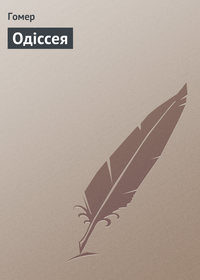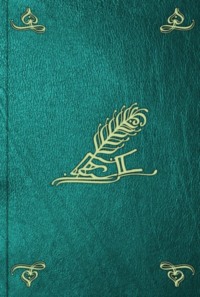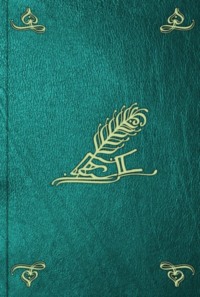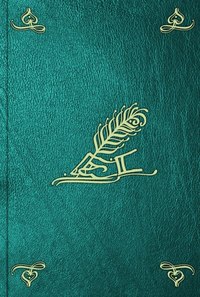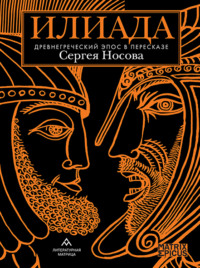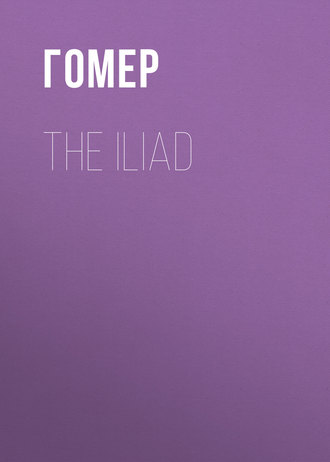 полная версия
полная версияThe Iliad
Thus spake he, and the brave son of Anchises disregarded him not. And they twain went right onward, their shoulders shielded by ox-hides dried and tough, and bronze thick overlaid. And with them went both Chromios and godlike Aretos, and their hearts were of high hope to slay the men and drive off the strong-necked horses – fond hope, for not without blood lost were they to get them back from Automedon. He praying to father Zeus was filled in his inmost heart with valour and strength. And straightway he spake to Alkimedon, his faithful comrade: "Alkimedon, hold the horses not far from me, but with their very breath upon my back; for I deem that Hector the son of Priam will not refrain him from his fury until he mount behind Achilles' horses of goodly manes after slaying us twain, and dismay the ranks of Argive men, or else himself fall among the foremost."
Thus said he, and called upon the Aiantes and Menelaos: "Aiantes, leaders of the Argives, and Menelaos, lo now, commit ye the corpse unto whoso may best avail to bestride it and resist the ranks of men, and come ye to ward the day of doom from us who are yet alive, for here in the dolorous war are Hector and Aineias, the best men of the Trojans, pressing hard. Yet verily these issues lie in the lap of the gods: I too will cast my spear, and the rest shall Zeus decide."
He said, and poised his far-shadowing spear and hurled it, and smote on the circle of the shield of Aretos, and the shield sustained not the spear, but right through went the bronze, and he forced it into his belly low down through his belt. And as when a strong man with a sharp axe smiting behind the horns of an ox of the homestead cleaveth the sinew asunder, and the ox leapeth forward and falleth, so leapt Aretos forward and fell on his back; and the spear in his entrails very piercingly quivering unstrung his limbs. And Hector hurled at Automedon with his bright spear, but he looked steadfastly on the bronze javelin as it came at him and avoided it, for he stooped forward, and the long spear fixed itself in the ground behind, and the javelin-butt quivered, and there dread Ares took away its force. And then had they lashed at each other with their swords hand to hand, had not the Aiantes parted them in their fury, when they were come through the mellay at their comrades' call. Before them Hector and Aineias and godlike Chromios shrank backward and gave ground and left Aretos wounded to the death as he lay. And Automedon, peer of swift Ares, stripped off the armour of the dead, and spake exultingly: "Verily, I have a little eased my heart of grief for the death of Menoitios' son, albeit a worse man than him have I slain."
Thus saying he took up the gory spoils and set them in his car, and gat him thereon, with feet and hands all bloody, as a lion that hath devoured a bull.
Now great-hearted Aias and Menelaos were aware of Zeus how he gave the Trojans their turn to victory. First of these to speak was great Aias son of Telamon: "Ay me, now may any man, even though he be a very fool, know that father Zeus himself is helping the Trojans. Come, let us ourselves devise some excellent means, that we may both hale the corpse away and ourselves return home to the joy of our friends, who grieve as they look hitherward and deem that no longer shall the fury of man-slaying Hector's unapproachable hand refrain itself, but fall upon the black ships. And would there were some comrade to carry tidings with all speed unto the son of Peleus, since I deem that he hath not even heard the grievous tidings, how his dear comrade is slain. But nowhere can I behold such an one among the Achaians, for themselves and their horses likewise are wrapped in darkness. O father Zeus, deliver thou the sons of the Achaians from the darkness, and make clear sky and vouchsafe sight unto our eyes. In the light be it that thou slayest us, since it is thy good pleasure that we die."
Then fair-haired Menelaos departed glancing everywhither, as an eagle which men say hath keenest sight of all birds under heaven, and though he be far aloft the fleet-footed hare eludeth him not by crouching beneath a leafy bush, but the eagle swoopeth thereon and swiftly seizeth her and taketh her life. Thus in that hour, Menelaos fosterling of Zeus, ranged thy shining eyes everywhither through the multitude of the host of thy comrades, if haply they might behold Nestor's son yet alive. Him quickly he perceived at the left of the whole battle, heartening his comrades and rousing them to fight. And fair-haired Menelaos came and stood nigh and said unto him: "Antilochos, fosterling of Zeus, come hither that thou mayest learn woful tidings – would it had never been. Ere now, I ween, thou too hast known by thy beholding that God rolleth mischief upon the Danaans, and with the Trojans is victory. And slain is the best man of the Achaians, Patroklos, and great sorrow is wrought for the Danaans. But run thou to the ships of the Achaians and quickly tell this to Achilles, if haply he may straightway rescue to his ship the naked corpse: but his armour is held by Hector of the glancing helmet."
Thus spake he, and Antilochos had horror of the word he heard. And long time speechlessness possessed him, and his eyes were filled with tears, and his full voice choked. Yet for all this disregarded he not the bidding of Menelaos, but set him to run, when he had given his armour to a noble comrade, Laodokos, who close anigh him was wheeling his whole-hooved horses.
So him his feet bare out of the battle weeping, to Achilles son of Peleus carrying an evil tale. But thy heart, Menelaos fosterling of Zeus, chose not to stay to aid the wearied comrades from whom Antilochos departed, and great sorrow was among the Pylians. But to them Menelaos sent noble Thrasymedes, and himself went again to bestride the hero Patroklos. And he hasted and stood beside the Aiantes and straightway spake to them: "So have I sent that man to the swift ships to go to fleet-footed Achilles. Yet deem I not that he will now come, for all his wrath against noble Hector, for he could not fight unarmed against the men of Troy. But let us ourselves devise some excellent means, both how we may hale the dead away, and how we ourselves may escape death and fate amid the Trojans' battle-cry."
Then answered him great Aias Telamon's son, saying: "All this hast thou said well, most noble Menelaos. But do thou and Meriones put your shoulders beneath the dead and lift him and bear him swiftly out of the fray, while we twain behind you shall do battle with the Trojans and noble Hector, one in heart as we are in name, for from of old time we are wont to await fierce battle side by side."
Thus spake he, and the others took the dead man in their arms and lifted him mightily on high. But the Trojan host behind cried aloud when they saw the Achaians lifting the corpse, and charged like hounds that spring in front of hunter-youths upon a wounded wild boar, and for a while run in haste to rend him, but when he wheeleth round among them, trusting in his might, then they give ground and shrink back here and there. Thus for a while the Trojans pressed on with all their power, striking with swords and double-headed spears, but when the Aiantes turned about and halted over against them, then they changed colour, and none dared farther onset to do battle around the dead.
BOOK XVIII
How Achilles grieved for Patroklos, and how Thetis asked for him new armour of Hephaistos; and of the making of the armour.
Thus fought the rest in the likeness of blazing fire, while to Achilles came Antilochos, a messenger fleet of foot. Him found he in front of his ships of upright horns, boding in his soul the things which even now were accomplished. And sore troubled he spake to his great heart: "Ay me, wherefore again are the flowing-haired Achaians flocking to the ships and flying in rout over the plain? May the gods not have wrought against me the grievous fears at my heart, even as my mother revealed and told me that while I am yet alive the best man of the Myrmidons must by deed of the men of Troy forsake the light of the sun. Surely now must Menoitios' valiant son be dead – foolhardy! surely I bade him when he should have beaten off the fire of the foe to come back to the ships nor with Hector fight amain."
While thus he held debate in his heart and soul, there drew nigh unto him noble Nestor's son, shedding hot tears, and spake his grievous tidings: "Ay me, wise Peleus' son, very bitter tidings must thou hear, such as I would had never been. Fallen is Patroklos, and they are fighting around his body, naked, for his armour is held by Hector of the glancing helm."
Thus spake he, and a black cloud of grief enwrapped Achilles, and with both hands he took dark dust and poured it over his head and defiled his comely face, and on his fragrant doublet black ashes fell. And himself in the dust lay mighty and mightily fallen, and with his own hands tore and marred his hair. And the handmaidens, whom Achilles and Patroklos took captive, cried aloud in the grief of their hearts, and ran forth around valiant Achilles, and all beat on their breasts with their hands, and the knees of each of them were unstrung. And Antilochos on the other side wailed and shed tears, holding Achilles' hands while he groaned in his noble heart, for he feared lest he should cleave his throat with the sword. Then terribly moaned Achilles; and his lady mother heard him as she sate in the depths of the sea beside her ancient sire. And thereon she uttered a cry, and the goddesses flocked around her, all the daughters of Nereus that were in the deep of the sea. With these the bright cave was filled, and they all beat together on their breasts, and Thetis led the lament: "Listen, sister Nereids, that ye all hear and know well what sorrows are in my heart. Ay me unhappy, ay me that bare to my sorrow the first of men! For after I had borne a son noble and strong, the chief of heroes, and he shot up like a young branch, then when I had reared him as a plant in a very fruitful field I sent him in beaked ships to Ilios to fight against the men of Troy; but never again shall I welcome him back to his home, to the house of Peleus. And while he yet liveth in my sight and beholdeth the light of the sun, he sorroweth, neither can I help him any whit though I go unto him. But I will go, that I may look upon my dear child, and learn what sorrow hath come to him though he abide aloof from the war."
Thus spake she and left the cave; and the nymphs went with her weeping, and around them the surge of the sea was sundered. And when they came to deep-soiled Troy-land they went up upon the shore in order, where the ships of the Myrmidons were drawn up thickly around fleet Achilles. And as he groaned heavily his lady mother stood beside him, and with a shrill cry clasped the bead of her child, and spake unto him winged words of lamentation: "My child, why weepest thou? what sorrow hath come to thy heart? Tell it forth, hide it not. One thing at least hath been accomplished of Zeus according to the prayer thou madest, holding up to him thy hands, that the sons of the Achaians should all be pent in at the ships, through lack of thee, and should suffer hateful things."
Then groaning heavily spake unto her Achilles fleet of foot: "My mother, that prayer truly hath the Olympian accomplished for me. But what delight have I therein, since my dear comrade is dead, Patroklos, whom I honoured above all my comrades as it were my very self! Him have I lost, and Hector that slew him hath stripped from him the armour great and fair, a wonder to behold, that the gods gave to Peleus a splendid gift, on the day when they laid thee in the bed of a mortal man. Would thou hadst abode among the deathless daughters of the sea, and Peleus had wedded a mortal bride! But now, that thou mayest have sorrow a thousand fold in thy heart for a dead son, never shalt thou welcome him back home, since my soul biddeth me also live no longer nor abide among men, if Hector be not first smitten by my spear and yield his life, and pay for his slaughter of Patroklos, Menoitios' son."
Then answered unto him Thetis shedding tears: "Short-lived, I ween, must thou be then, my child, by what thou sayest, for straightway after Hector is death appointed unto thee."
Then mightily moved spake unto her Achilles fleet of foot: "Straightway may I die, since I might not succour my comrade at his slaying. He hath fallen afar from his country and lacked my help in his sore need. Now therefore, since I go not back to my dear native land, neither have at all been succour to Patroklos nor to all my other comrades that have been slain by noble Hector, but I sit beside my ships a profitless burden of the earth, I that in war am such an one as is none else of the mail-clad Achaians, though in council are others better – may strife perish utterly among gods and men, and wrath that stirreth even a wise man to be vexed, wrath that far sweeter than trickling honey waxeth like smoke in the breasts of men, even as I was wroth even now against Agamemnon king of men. But bygones will we let be, for all our pain, curbing the heart in our breasts under necessity. Now go I forth, that I may light on the destroyer of him I loved, on Hector: then will I accept my death whensoever Zeus willeth to accomplish it and the other immortal gods. For not even the mighty Herakles escaped death, albeit most dear to Kronian Zeus the king, but Fate overcame him and Hera's cruel wrath. So also shall I, if my fate hath been fashioned likewise, lie low when I am dead. But now let me win high renown, let me set some Trojan woman, some deep-bosomed daughter of Dardanos, staunching with both hands the tears upon her tender cheeks and wailing bitterly; yea, let them know that I am come back, though I tarried long from the war. Hold not me then from the battle in thy love, for thou shalt not prevail with me."
Then Thetis the silver-footed goddess answered him, saying: "Yea verily, my child, no blame is in this, that thou ward sheer destruction from thy comrades in their distress. But thy fair glittering armour of bronze is held among the Trojans. Hector of the glancing helm beareth it on his shoulders in triumph, yet not for long, I ween, shall he glory therein, for death is hard anigh him. But thou, go not yet down into the mellay of war until thou see me with thine eyes come hither. In the morning will I return, at the coming up of the sun, bearing fair armour from the king Hephaistos."
Thus spake she and turned to go from her son, and as she turned she spake among her sisters of the sea: "Ye now go down within the wide bosom of the deep, to visit the Ancient One of the Sea and our father's house, and tell him all. I am going to high Olympus to Hephaistos of noble skill, if haply he will give unto my son noble armour shining gloriously."
Thus spake she, and they forthwith went down beneath the surge of the sea. And the silver-footed goddess Thetis went on to Olympus that she might bring noble armour to her son.
So her unto Olympus her feet bore. But the Achaians with terrible cries were fleeing before man-slaying Hector till they came to the ships and to the Hellespont. Nor might the well-greaved Achaians drag the corpse of Patroklos Achilles' squire out of the darts, for now again overtook him the host and the horses of Troy, and Hector son of Priam, in might as it were a flame of fire. Thrice did glorious Hector seize him from behind by the feet, resolved to drag him away, and mightily called upon the men of Troy. Thrice did the two Aiantes, clothed on with impetuous might, beat him off from the dead man, but he nathless, trusting in his might, anon would charge into the press, anon would stand and cry aloud, but he gave ground never a whit. As when shepherds in the field avail nowise to chase a fiery lion in fierce hunger away from a carcase, so availed not the two warrior Aiantes to scare Hector son of Priam from the dead. And now would he have won the body and gained renown unspeakable, had not fleet wind-footed Iris come speeding from Olympus with a message to the son of Peleus to array him, unknown of Zeus and the other gods, for Hera sent her. And she stood anigh and spake to him winged words: "Rouse thee, son of Peleus, of all men most redoubtable! Succour Patroklos, for whose body is terrible battle afoot before the ships. There slay they one another, these guarding the dead corpse, while the men of Troy are fierce to hale him unto windy Ilios, and chiefliest noble Hector is fain to drag him, and his heart biddeth him fix the head on the stakes of the wall when he hath sundered it from the tender neck. But arise, lie thus no longer! let awe enter thy heart to forbid that Patroklos become the sport of dogs of Troy. Thine were the shame if he go down mangled amid the dead."
Then answered her fleet-footed noble Achilles: "Goddess Iris, what god sent thee a messenger unto me?"
And to him again spake wind-footed fleet Iris: "It was Hera that sent me, the wise wife of Zeus, nor knoweth the high-throned son of Kronos nor any other of the Immortals that on snowy Olympus have their dwelling-place."
And Achilles fleet of foot made answer to her and said: "And how may I go into the fray? The Trojans hold my arms; and my dear mother bade me forbear to array me until I behold her with my eyes returned, for she promised to bring fair armour from Hephaistos. Other man know I none whose noble armour I might put on, save it were the shield of Aias Telamon's son. But himself, I ween, is in the forefront of the press, dealing death with his spear around Patroklos dead."
Then again spake unto him wind-footed fleet Iris: "Well are we also aware that thy noble armour is held from thee. But go forth unto the trench as thou art and show thyself to the men of Troy, if haply they will shrink back and refrain them from battle, and the warlike sons of the Achaians take breath."
Thus spake fleet-footed Iris and went her way. But Achilles dear to Zeus arose, and around his strong shoulders Athene cast her tasselled aegis, and around his head the bright goddess set a crown of a golden cloud, and kindled therefrom a blazing flame. And as when a smoke issueth from a city and riseth up into the upper air, from an island afar off that foes beleaguer, while the others from their city fight all day in hateful war, – but with the going down of the sun blaze out the beacon-fires in line, and high aloft rusheth up the glare for dwellers round about to behold, if haply they may come with ships to help in need – thus from the head of Achilles soared that blaze toward the heavens. And he went and stood beyond the wall beside the trench, yet mingled not among the Achaians, for he minded the wise bidding of his mother. There stood he and shouted aloud, and afar off Pallas Athene uttered her voice, and spread terror unspeakable among the men of Troy. Clear as the voice of a clarion when it soundeth by reason of slaughterous foemen that beleaguer a city, so clear rang forth the voice of Aiakides. And when they heard the brazen voice of Aiakides, the souls of all of them were dismayed, and the horses of goodly manes were fain to turn the chariots backward, for they boded anguish in their hearts, And the charioteers were amazed when they saw the unwearying fire blaze fierce on the head of the great-hearted son of Peleus, for the bright-eyed goddess Athene made it blaze. Thrice from over the trench shouted mightily noble Achilles, and thrice were the men of Troy confounded and their proud allies. Yea there and then perished twelve men of their best by their own chariot wheels and spears. But the Achaians with joy drew Patroklos forth of the darts and laid him on a litter, and his dear comrades stood around lamenting him; and among them followed fleet-footed Achilles, shedding hot tears, for his true comrade he saw lying on the bier, mangled by the keen bronze. Him sent he forth with chariot and horses unto the battle, but home again welcomed never more.
Then Hera the ox-eyed queen sent down the unwearying Sun to be gone unwillingly unto the streams of Ocean. So the Sun set, and the noble Achaians made pause from the stress of battle and the hazardous war.
But the Achaians all night made moan in lamentation for Patroklos. And first of them in the loud lamentation was the son of Peleus, laying upon the breast of his comrade his man-slaying hands and moaning very sore, even as a deep-bearded lion whose whelps some stag-hunter hath snatched away out of a deep wood; and the lion coming afterward grieveth and through many glens he rangeth on the track of the footsteps of the man, if anywhere he might find him, for most bitter anger seizeth him; – thus Achilles moaning heavily spake among the Myrmidons: "Ay me, vain verily was the word I uttered on that day when I cheered the hero Menoitios in his halls and said that I would bring back to Opoeis his son in glory from the sack of Ilios with the share of spoil that should fall unto him. Not all the purposes of men doth Zeus accomplish for them. It is appointed that both of us redden the same earth with our blood here in Troy-land, for neither shall the old knight Peleus welcome me back home within his halls, nor my mother Thetis, but even here shall earth keep hold on me. Yet now, O Patroklos, since I follow thee under earth, I will not hold thy funeral till I have brought hither the armour and the head of Hector, thy high-hearted slayer, and before thy pyre I will cut the throats of twelve noble sons of the men of Troy, for mine anger thou art slain. Till then beside the beaked ships shalt thou lie as thou art, and around thee deep-bosomed women, Trojan and Dardanian, shall mourn thee weeping night and day, even they whom we toiled to win by our strength and, our long spears when we sacked rich cities of mortal men."
Thus spake noble Achilles, and bade his comrades set a great tripod on the fire, that with all speed they might wash from Patroklos the bloody gore. So they set a tripod of ablution on the burning fire, and poured therein water and took wood and kindled it beneath; and the fire wrapped the belly of the tripod, and the water grew hot. And when the water boiled in the bright bronze, then washed they him and anointed with olive oil, and filled his wounds with fresh ointment, and laid him on a bier and covered him with soft cloth from head to foot, and thereover a white robe. Then all night around Achilles fleet of foot the Myrmidons made lament and moan for Patroklos.
Meanwhile Zeus spake unto Hera his sister and wife: "Thou hast accomplished this, O Hera, ox-eyed queen, thou hast aroused Achilles fleet of foot. Verily of thine own children must the flowing-haired Achaians be."
Then answered unto him Hera the ox-eyed queen: "Most dread son of Kronos, what is this word thou hast said? Truly even a man, I ween, is to accomplish what he may for another man, albeit he is mortal and hath not wisdom as we. How then was I who avow me the first of goddesses both by birth and for that I am called thy wife, and thou art king among all Immortals – how was I not in mine anger to devise evil against the men of Troy?"
So debated they on this wise with one another. But Thetis of the silver feet came unto the house of Hephaistos, imperishable, starlike, far seen among the dwellings of Immortals, a house of bronze, wrought by the crook-footed god himself. Him found she sweating in toil and busy about his bellows, for he was forging tripods twenty in all to stand around the wall of his stablished hall, and beneath the base of each he had set golden wheels, that of their own motion they might enter the assembly of the gods and again return unto his house, a marvel to look upon. Thus much were they finished that not yet were away from the fire, and gathered all his gear wherewith he worked into a silver chest; and with a sponge he wiped his face and hands and sturdy neck and shaggy breast, and did on his doublet, and took a stout staff and went forth limping; but there were handmaidens of gold that moved to help their lord, the semblances of living maids. In them is understanding at their hearts, in them are voice and strength, and they have skill of the immortal gods. These moved beneath their lord, and he gat him haltingly near to where Thetis was, and set him on a bright seat, and clasped her hand in his and spake and called her by her name: "Wherefore, long-robed Thetis, comest thou to our house, honoured that thou art and dear? No frequent comer art thou hitherto. Speak what thou hast at heart; my soul is fain to accomplish it; if accomplish it I can, and if it be appointed for accomplishment."


